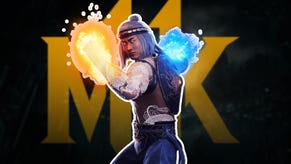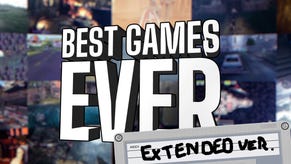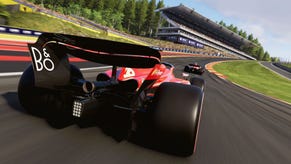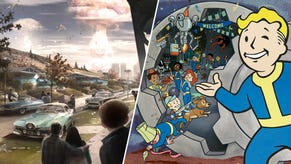Rick & Morty Co-Creator Justin Roiland Wants to Make Traditional Console Games, Too
"Holy s**t I have a f***ing game studio and this is insane."
This article first appeared on USgamer, a partner publication of VG247. Some content, such as this article, has been migrated to VG247 for posterity after USgamer's closure - but it has not been edited or further vetted by the VG247 team.
Justin Roiland and William Pugh are both known for creating works that are at once incredibly subversive, smartly meta, and outrageously funny.
You may know Roiland for his work as co-creator and the voices behind the adult animation Rick and Morty. Meanwhile William Pugh is one half of the team behind the incredible indie hit The Stanley Parable. In retrospect, both The Stanley Parable and Rick and Morty share a strand of gonzo DNA that makes a partnership between the two creators seem perfectly natural.
At this year's PlayStation Experience in early December, I sat down with the two creators to talk about Accounting Plus, a new port of their HTC Vive VR game that's out today on PlayStation VR. The game, much like Pugh and Roiland, is a humorous merging of talents between Pugh's Crows Crows Crows studio and Roiland's Squanch Games. It's an interactive adventure game that's hard to define other than it being perfect for players who want to experience an alchemic VR concoction from both Roiland and Pugh.
So tell us about Accounting Plus.
William Pugh: It's quite an introspective piece about mostly cooling machines, skeleton xylophones.
Sounds about right. What's new in the PlayStation VR version?
WP: To be on brand: It's twice the size double the price.
Justin Roiland: It has a price tag now but it's more than twice the size. There is a lot of new stuff.
Why revisit Accounting for your PSVR debut?
JR: Well I—like in all seriousness—I just want VR to do well across all hardware. And the opportunity came up to do a port and we were like, "Yeah." Like it was fun to make the first one and we decided to just, you know, if we're going to dig in and pop the hood and rework the mechanics and stuff, why not add a bunch of new content?
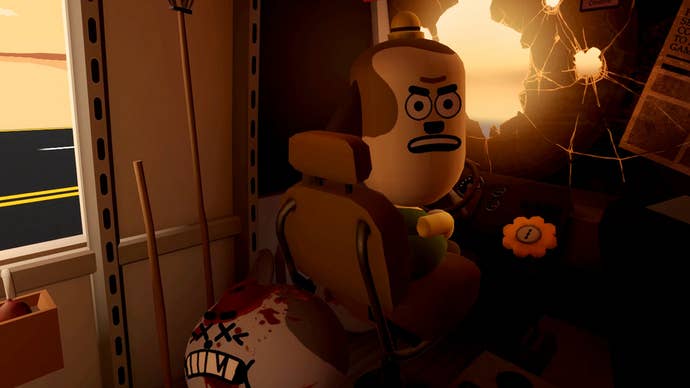
So Justin, you jumped into VR pretty early. Back when the technology was still just emerging. Have your views on VR changed at all in the years since the tech first debuted?
JR: It's amazing. It's still incredible. I mean it's still super exciting and the stuff you can do in the medium is unlike anything else in terms of just narrative. You know even mechanics, game mechanics, I mean having your head as a controller you know in a weird way. It's not literally a controller, but it's an input. [There are] so many interesting things you can do to kind of f**k with the player. In a good way.
Is that your goal? To f**k with the player?
JR: I mean I want to entertain people and I want to teleport people to different worlds and stuff, because that's really what the most exciting about it is. Taking players and taking them to a completely new, weird world that you can never ever visit in reality.
It's always [about] surprising [players], always staying ahead of them. In terms... of the audience not really knowing what's going to happen next. That's really important I think. [It's] a little bit of f**king with people, but it's mainly you want them on your side. You don't want to p**s anyone off or make anyone sick, which is the most important thing
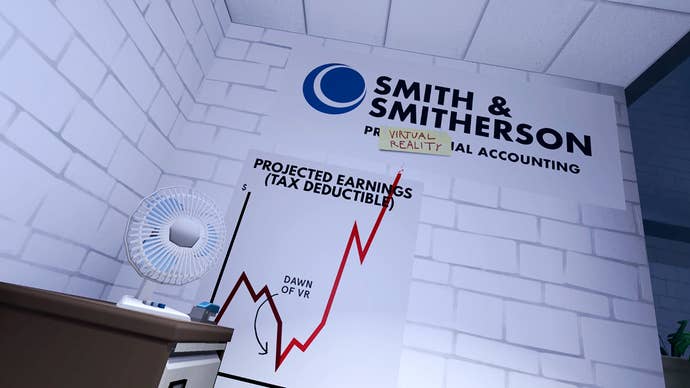
Is that how you and Will got together? Because from Will's work with games like The Stanley Parable, there's a lot of common ground with playing with players there.
WP: I'm not going to make a big deal out of it.
JR: Yeah I mean we met actually [on] Twitter and we started talking about VR immediately. That was kind of the big thing that we were just talking about it.
WP: We [were] Skyping, we [were] exchanging prototypes, and then it was like, "Why not meet up?"
So Will, were you also looking into VR around this time? Looking towards it for your next projects?
WP: Like [VR is] definitely separate from video games as a medium. I don't view it as the same thing. It's very merged. The lines are definitely blurred with Sony because they're using existing gaming consoles to power VR experiences. But I think the real future of the medium is stuff like Accounting Plus which is created exclusively for VR, with VR in mind.
I think a lot of games have become stagnated in a way because they're holding onto 20 years of baggage from old technical limitations. Like, "Oh yeah this is going to be in an arcade. You gotta have lives, you gotta have levels. There's points you you can score by doing things." We've got a medium now where everything has changed. You press buttons and you see things change, but that's about the only similarity.
And now we can start to remove some of those [gaming] preconceptions. Like what makes a game? What makes an experience? Start to explore that and I think VR is a threshold. It's kind of like a new chapter. That's cool, but it's also materially useful.
JR: That's what Ernest Hemingway said. That VR is "materially useful."
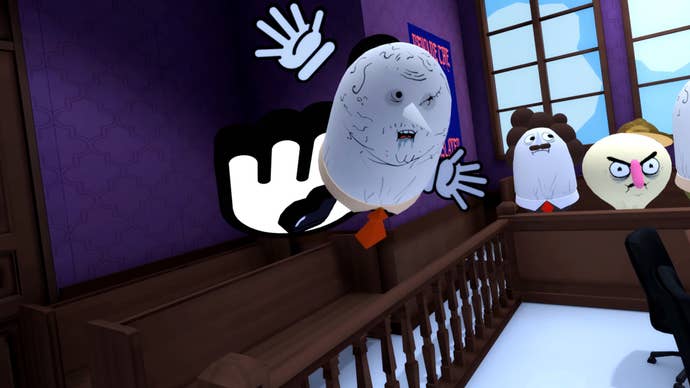
So that's your primary focus then? No future ports of Accounting Plus on the Switch or anything like that?
JR: I don't know how... how we would port [Accounting Plus] over to traditional [consoles]? Like it's so VR-centric. I mean I'm sure there's a way to do it, we might end up looking into that. But everything VR that we're doing is from the ground up. Right from the beginning. [Like] how do you get around? All the interesting stuff.
It's a new Wild West. A lot of great devs [are] figuring our really interesting [ways to move]. I mean, I always thought that [free movement] was not going to work, and it works fine. I'm playing Skyrim, I'm playing Resident Evil 7. It's like, it works. I don't get sick. I don't know how I'm not getting sick because I really thought I would with free movement.
So are those the VR games you're playing right now?
JR: It's cool to see triple-A games like that coming and supporting VR because VR needs as much as it can get in the way of software. And really good software to push the hardware. But yeah, I have been playing those games. They're pretty incredible, it's insane. I mean how many times have we all been in that beginning of Skyrim in the cart. I've played this a thousand times. Every time you started a new character, every time you get it on a new console or whatever. And it's weird to be in VR for that. I was like, "Oh my god! I'm there, I'm actually in the cart!"
WP: Like [VR's] clearly not there. If you look at the numbers there's not enough to sustain right now. But clearly if you look around, the investment is there to make it worthwhile for people.
JR: Detroit VR is coming I hear. [Editor's note: Detroit: Become Human VR is not coming to VR.]
WP: So now it's only a matter of time before it crosses that threshold of the platforms having enough s**t that people will want to play that it will just be worth getting inherently. And it won't be like, "I'll be an early adopter." It'll be like, "I'll buy one because there's a load of titles that I want to play."
JR: That's where I think we're at right now, or getting there I mean. We're really close. I was telling people at the autograph [signing] yesterday [that] now's the time to get PSVR. There's legitimately enough content on there that it's worth getting now. It's hard to say that six months ago. But. There's games I love on there.

There's been a lot in six months.
JR: I know, so much stuff it's crazy. But it's really good and the Rick and Morty game comes out in a few months and that's exciting that we've got that ported over. So yeah, I think adoption is just going to happen.
So you haven't lost any enthusiasm for VR I take it?
JR: Oh I love it. It's definitely tough for a studio to be profitable right now in VR just because of the numbers. But so you know as a studio, for Squanch games, we're always going to be focused on emerging technologies: VR, AR all that stuff. But we're probably going to start dabbling in traditional [development] as well.
We have an amazing team and they're all very experienced and they can game. And I've never had that before. At my fingertips, creatively. So I'm like, "Holy s**t, I have a f**king game studio and this is insane." And so we're brainstorming and talking about a small scope traditional "something" we can release across all the different hardware and PC and console and stuff. But it's all going to subsidize VR. VR is just too incredible, it's too magical.
So there are projects in the pipeline after Accounting Plus which I'm sure you can't talk about yet.
JR: Yeah I can't. We do have two—there are actually a few things in development. Unannounced things that are really, really cool and exciting. By a rule—and I don't know how you feel about this [William]—like for me with VR I want to take players to other worlds. And I want them to be in those worlds, living in those worlds, experiencing the worlds. I want the characters to be talking to them.
I don't like VR so much as I like a new screen. I played a few games where its like, "Oh, the VR is being used just as a fancy, cool, new screen where there's my guy down there and I can move him around and I can look around and stuff." But I'm not in the world. I'm sort of just a floating disembodied head watching the playing field. And I think that's cool, those games are fun, but not a thing that I would really like [to make], sort of as a rule.
Everything we make we want it to feel like you are actually being teleported to a weird interesting place. Accounting Plus is that for sure. You are the person being talked to and it really does kind of feel like you're being observed by them, by the characters and NPCs and stuff and they're very responsive to what you're doing in the space. [...] In VR, when a character is yelling at you it's just weird, it's so weird. They recognize that you pick something up and they're screaming about that thing or whatever you're doing in the space and then they're very aware of it. It clicks in a different way and I think that's that's the power of VR. I want to see more devs doing that kind of stuff.
It sounds like you have a very clear idea about what you want in VR. There are rules for you.
JR: Sure, and rules are meant to be broken, man.
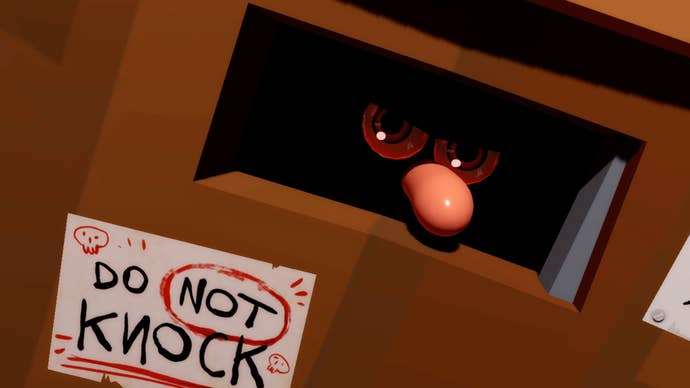
You mentioned that there's a new, super secret level in Accounting Plus. Could you tell us a bit more about that, maybe a hint?
JR: We went to a lot of trouble to make sure this wasn't something that would just get figured out within 24 hours.
WP: It's a place you can go to in the game and it's a level like every other kind of level. There's normal levels that everyone will see, secret levels which only some people will see, and there's the secret Zoo level which we think nobody will [see]. This is probably the hardest to find secret [in the game].
Like you know from Stanley Parable, I've been hiding secrets in games. Like that's my entire life. I've done GDC talk about secrets and all that. So I think with this game. We've found the perfect [secret].
JR: It's crazy the amount of resources and time that went into this thing that probably no one will see. I mean we have systems that are only in this level. Like, literally it's insane.
WP: And there's like a broader overarching—you've got to do a few things in a few different places. It's not easy. We've got a bet going, we have a pool.
For about how long it will take for players to find the secret level?
WP: Justin, you're going for like 24 hours?
JR: I still think 24 hours. But just because everybody's so savvy nowadays. It's like you can't hide something enough.
WP: At Crows Crows Crows we've done some ARG stuff before... Like the Overwatch ARG stuff, people tear through that. But this is like—
So what's your bet?
WP: Six months. I think six months.
Well I guess we'll revisit this sometime between a day or six month after release. Thank you for your time.


